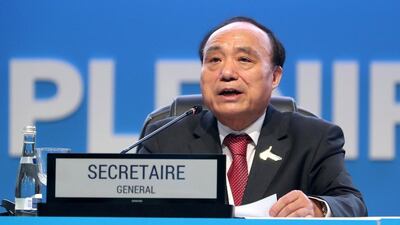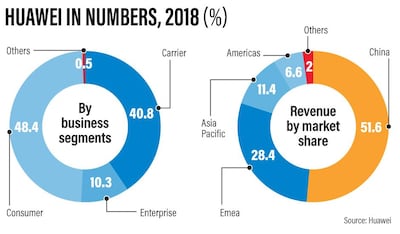International Telecommunication Union, the UN-backed internet and telecoms agency, says it doesn't share the same security concerns as the US regarding Huawei 5G equipment but China's largest technology company has to adhere to all global standards.
"So far, we have not come across any evidence pointing at security concerns of the equipment," Houlin Zhao, secretary general of ITU, told The National. "Huawei has to follow all security standards… there is no other choice."
“Our job is to develop standards and they will be the same for everyone,” said Mr Houlin, who had served as an engineer in the department of Posts and Telecommunications of China, before moving to the UN’s telecom union.
Shenzhen-headquartered Huawei is facing mounting global pressure - led by the US - over accusations its equipment is not secure and facilitates espionage. Following a campaign by the US, UK telecom BT has barred Huawei 5G equipment from its core network. Australia and New Zealand have also announced they would not allow Huawei to be involved in building 5G systems in their countries.
Fifth generation of cellular mobile technology, or 5G, will enable rapid data transfer, energy saving, cost reduction and widespread device connectivity through Internet of Things.
Despite the restrictions in the US and other countries Huawei has plowed forward securing 40 commercial contracts to build and operate 5G telecommunications infrastructure globally as of the end of March. The company's earnings soared 25 per cent in 2018 and revenues grew nearly 20 per cent, crossing the $100 billion mark for the first time.
The technology giant derived about 52 per cent of its revenue from its home market in China, which was followed by the EMEA region (Europe, Middle East, Africa) that accounted for 28 per cent, Asia Pacific in third place (11 per cent), the Americas in fourth (6.6 per cent) and other markets accounting for 2 per cent of total sales.
As a specialised agency, ITU has permanent presence in 13 countries and it has also set up a security study group of global experts to ensure the security of wireless networks. Mr Houlin said a fair ground should be provided to all global manufacturers to ensure competitiveness in the 5G industry.
“Equal business opportunities should be provided to all players and if any company is not following the right practices, it could be charged,” said Mr Houlin.
“Every country has its own set of rules to verify the legitimacy of 5G equipment. If they don’t like one manufacturer, they can switch to another… as many more options are available in the market," he added. "Moreover, 5G is not the privilege of one company or one country. It is a global technology - an ITU’s technology.”
Despite global pressure, last month Huawei said it aims to boost its income further in 2019 on the back of a widespread roll-out of 5G networks around the world.
The Chinese vendor has signed 23 5G contracts in Europe, 10 in Middle East, six in Asia-Pacific and one in Africa. The company has already shipped over 70,000 5G base stations globally and aims to dispatch another 100,000 by the end of May. Its main rivals Nokia and Ericsson have each secured 16 5G contracts as of the end of March.
ITU is also expected to finalise the basic standards and spectrum for 5G at its World Radiocommunication Conference in Sharm el-Sheikh in Egypt, in the last quarter of this year.
“We are on track to finalise 5G standards. I don’t think that security concerns, raised against equipment, will slow down the roll-out process globally,” said Mr Houlin, admitting that concerns have impacted the industry negatively to some extent.
“Only last week in Geneva, a delegation told me that they have decided to not go for 5G because of security issues. So there is a negative effect.”



